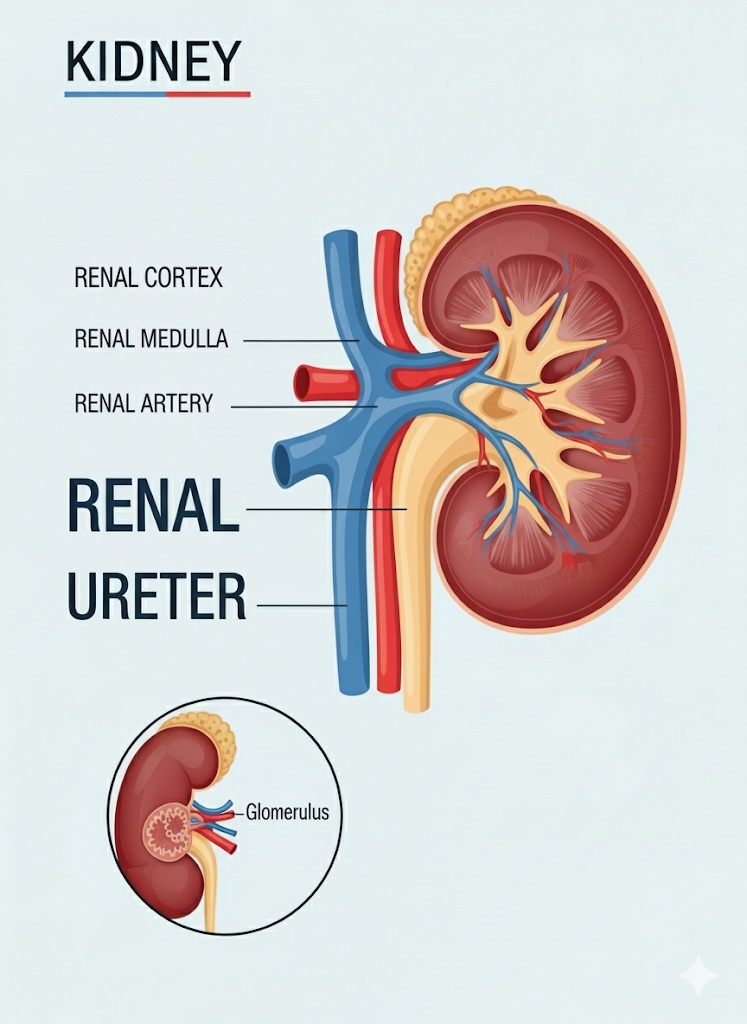Kidney Stones Treatment: A Holistic Homoeopathic Approach
Kidney stones, also known as renal calculi are quite common and can be painful. In Gupta Homoeo Clinic, we provide gentle non-surgical treatment for kidney stones treatment by homeopathy. Our individualized approach aims to eliminate stones, tackle the root causes, improve overall health and avoid the recurrence of.
Since its beginning, Gupta Homoeo Clinic has been a reliable resource for kidney stone treatment without surgery in Jaipur. Our highly trained homeopathic doctors provide individualized treatment, by focusing on your specific health and signs. Our whole-person approach to health is our principle and a permanent therapy that stimulates your body’s healing processes. This provides an effective alternative. We provide a solid history of success and long-lasting health. If you are suffering from Kidney Stones then you can consult our homeopathy doctors online for natural treatments.

What is a Kidney Stone?
Kidney stones (renal calculi) are hard crystals that form in the kidneys, which are created by minerals and salts. They can travel through the urinary tract—to the ureters, bladder, or urethra—and sometimes cause substantial pain. If treated in a timely manner, pain can be controlled and most patients will recover completely.
Symptoms of Kidney stone
Kidney stones often cause severe, wave-like pain, starting in the lower back/side and radiating to the abdomen and groin.
Common Kidney Stone Symptoms:
🔴
Severe Pain
In back, side, lower abdomen, or groin; wave-like and intense.
🩸
Blood in Urine
(Hematuria) May appear pink, red, or brown.
🤢
Nausea & Vomiting
Often accompanies
intense pain
🐽
Foul-smelling or Cloudy Urine
In back, side, lower abdomen, or groin; wave-like and intense.
🤒
Fever & Chills
Signs of possible
infection.
🚹
Frequent Urination
(With small amounts
of urine)
🔥
Difficult or Painful Urination
Burning sensation
during urination
Note: Early-stage kidney stones might not show symptoms, making regular check-ups important.
Types of Kidney Stones:
- Calcium Oxalate: Most common; irregular with sharp projections, often causing bleeding.
- Phosphate: Smooth, round, dirty white or yellowish; found in acidic urine.
- Uric Acid: Develops in acidic urine; hexagonal, yellow to reddish-brown; more common in men.
- Struvite: Often forms in women due to urinary tract infections.
- Cystine: Rare; develops in individuals with a genetic disorder (‘cystinuria’); hexagonal, pink or yellow in acidic urine.

Do’s & Don’ts
Lifestyle and dietary habits significantly reduce kidney stone formation and recurrence.
Do’s:
- Drink Plenty of Water: Keep urine dilute to flush out minerals. Citrus juices help.
- Eat Enough Calcium from Natural Foods: Binds oxalates, preventing calcium oxalate stones.
- Maintain a Healthy Weight: Reduces metabolic stress on kidneys.
- Consider Magnesium Intake: Helps prevent calcium-oxalate combination.
- Regular Diagnosis: Important for early detection, especially with risk factors.
Don’ts:
- Limit Sugar Intake: High sugar alters mineral balance, increasing stone risk. Avoid sugary drinks.
- Reduce High-Protein & High-Salt Diet: Increases calcium/uric acid in urine.
- Avoid Excessive Sweating: Dehydration concentrates urine minerals; rehydrate adequately.
- Self-Medicate: Be cautious with certain medications that increase urinary calcium; always consult a doctor.
- Excessive Vitamin D Supplements: High doses increase calcium absorption, potentially forming stones.
How Homeopathy Treats Kidney Stones
The homeopathic remedy for renal calculi (kidney stones) offers a gentle approach to effective homeopathy for kidney stones which tends to the person’s overall sense of well-being. Homeopathic treatment tends to the imbalance of the body that causes stones to form. The principle of homeopathic treatment is holism as it will stimulate the bodily natural healing process to dissolve and eliminate stones, while also controlling reoccurrence of stones. Homeopathic treatment will be tailored to the individual based on both symptoms and their constitution.
Ready to Find a Permanent, Non-Surgical Cure?
Schedule a consultation with our experienced homeopathic doctors to get a personalized treatment plan for your kidney stones.

Dr. Sachin Gupta
Homoeopathic Physician MD(Hom.)
Renowned homeopathic physician and skin specialist in Jaipur, dedicated to providing personalized, effective treatments.

Dr. Saveena Gupta
Homoeopathic Physician BHMS, DNHE
Highly regarded homeopathic doctor in Jaipur, specializing in women’s health and gynecological disorders.
Our Online Booking & Doctors: Consult our experienced homeopathic doctors online for natural treatments. We are the best choice for those seeking homoeopathic doctors in Jaipur for kidney stone treatment.
Homeopathy Medicines for Kidney Stone Treatment:
- Berberis Vulgaris: For sharp left kidney pains radiating to the thigh, and burning urination.
- Lithium Carbonate: For heavy, reddish-brown urine deposits and sharp bladder pains.
- Benzoic Acid: For strong, offensive urine odor and dark brown urine.
Note: Please do consult with your doctor first, before to take any medicine. The remedies mentioned over here are for the information only. We do not recommend to take any medicine without taking prior consultation. Homeopathy treatments for any diseases and treatment vary according to your body symptoms and structure.
Few of the above-mentioned treatment include home remedies for kidney stones and this can be followed easily by the patient. Our clinic is the best choice for those seeking homoeopathic doctors in Jaipur for kidney stone treatment.. The clinic has more than 40 years of experience and it has treated many cases of renal calculi. If you want to treat the kidney stones without undergoing any surgery, homeopathic treatment is the key to solve the problem.
Disclaimer
The information provided is for educational purposes only and is not a substitute for professional medical advice or treatment. Always consult a qualified homeopathic doctor before starting any treatment. Results may vary based on individual health conditions. Avoid self-medication.
FAQs
Q 2. How long does the treatment take?
Answer – The duration varies depending on the size, type, and location of the stone, as well as the individual’s overall health. Some patients experience relief from pain quickly, while dissolving the stone can take several weeks to months.
Q 3. Is homeopathic kidney stones treatment safe?
Answer – Absolutely. Homeopathic remedies are prepared from natural sources and are given in micro-doses, making them safe, non-toxic, and free from adverse side effects.
Q 4. Can I avoid surgery with homeopathy?
Answer – This is our primary goal and a reality for a vast number of our patients. By helping the body dissolve and pass the stone, the need for surgical intervention is often eliminated.